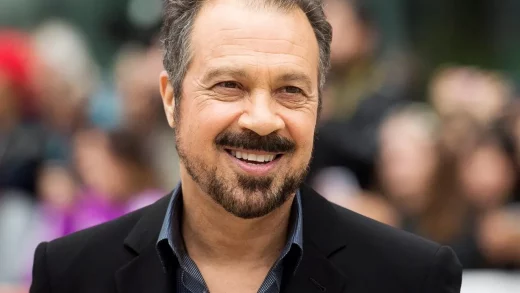:format(webp)/https://www.thestar.com/content/dam/thestar/entertainment/television/2023/06/09/saying-so-long-farewell-to-ted-lasso-it-wasnt-perfect-but-it-made-us-feel-things/slings_and_arrows.jpg)
What TV shows are dominating the conversation, capturing the zeitgeist, have something interesting to say or are hidden gems waiting to be uncovered? We take a look ahead of your weekend watch. And, be warned, there are spoilers ahead.
There’s a scene in the series finale of “Ted Lasso” that encapsulates both the show’s charm and the twee-ness that could drive critics nuts.
It’s coach Ted Lasso’s (Jason Sudeikis) last practice with the AFC Richmond football team (soccer for us North Americans) before he returns to the U.S., and the players perform “So Long, Farewell” from Rodgers and Hammerstein’s “The Sound of Music,” which is also the name of the episode.
In the 1965 film the song is sung by children and teenagers, capped by an adorable six-year-old. In the AFC Richmond version, it’s sung by sweaty men, capped by adorable Mexican player Dani Rojas (Cristo Fernández).
I come down on the charming side of the equation in this instance. The scene made me laugh out loud and then it turned into cry-laughing.
One thing “Ted Lasso” has always been good at is pulling heartstrings.
Ted is an American football coach hired to manage an underachieving British soccer team because the team’s owner, who picked up the club in her divorce settlement, wants to tank it to get revenge against her cheating ex.
But Ted’s aw shucks optimism and determination to see the best in people, even surly, arrogant football players who think he’s a “wanker,” begins to change the way those around him see themselves and others. Thus, we have grown men unironically re-enacting a song from a notoriously sentimental musical.
“Ted Lasso” has sometimes been compared to another famous feel-good show that dealt in love and kindness, “Schitt’s Creek.” But whereas character metamorphosis on that series tended to feel more organic — aided by the fact it had more than double the episodes and fewer folks to transform — on “Lasso,” it sometimes felt unmoored, particularly in this third and final season.
(In its promotional materials, Apple was still calling this the “season” rather than the series finale, but you can’t have a show called “Ted Lasso” when your title character has left the field.)
Nowhere was the short shrift given a character arc more apparent than with Nate Shelley (Nick Mohammed). He began as AFC Richmond’s underappreciated and ridiculed kit man, rose to the coaching staff due to the brilliance of his football acumen and Ted’s appreciation, but he took a heel turn at the end of Season 2. He betrayed Ted and abandoned the team to become head coach for rival West Ham United.
Nate was in full villain mode as Season 3 began but started to waver, and next thing you know he has quit West Ham (off-screen) and returned to Richmond, not — despite his reputation as a football “wonder kid” — as a coach but as assistant to the new kit man. And, notwithstanding his supposedly genius-level IQ and the insecurity that roiled him since Season 1, he’s thrilled with this demotion?
Not much of a reward for one of the show’s breakout characters.
Still, the series also gave us a thoroughly enjoyable redemption arc in turning star player Jamie Tartt (Phil Dunster) from an arrogant bully into a team player who was actively striving to do better — although even that was undermined by a plot device that had Jamie and friend Roy Kent (Brett Goldstein) physically fight over their shared ex Keeley (Juno Temple).
“Ted Lasso” also had a tendency to raise meaty issues only to bat them away like it was heading a soccer ball. Think the racist vilification of Nigerian player Sam Obisanya (Toheeb Jimoh) or Colin Hughes (Billy Harris) coming out as gay.
Nonetheless, I still have a lot of affection for “Ted Lasso.” It made us feel things; it made us smile and laugh and cry, sometimes all at the same time.
So long, farewell.
Art delightfully imitates life in ‘Slings & Arrows’
Last week, Canadian TV star Paul Gross opened as “King Lear” at the Stratford Festival.
Twenty years ago, a Canadian TV comedy debuted in which Gross played a disgraced Shakespearean actor who takes on the artistic directorship of a theatre festival very much like Stratford.
I’m talking about “Slings & Arrows,” a gem of a show that I will never tire of recommending.
Gross’s Geoffrey Tennant — who, notoriously, had a nervous breakdown in the middle of a performance of “Hamlet” — returns to run the New Burbage Theatre Festival. Geoffrey must contend not only with reviving an ailing artistic enterprise and his own fragile mental state, but with the ghost of the previous artistic director, played by brilliant real-life theatre artist Stephen Ouimette.
And then there are the sensitivities of the actors to manage, not least Geoffrey’s ex-girlfriend leading lady Ellen (Gross’s real-life wife, Martha Burns), and the tension between making art and making money, with general manager Richard Smith-Jones (co-creator Mark McKinney) crassly representing the latter interest.
Part of the fun of watching “Slings & Arrows” now is seeing all the Canadian actors in it who have gone on to wider acclaim, like Oscar winner Sarah Polley, Oscar nominee Rachel McAdams and Emmy winner Luke Kirby. But if you’re a Canadian theatre aficionado you’ll also appreciate seeing pros like Ouimette, Colm Feore, Geraint Wyn Davies and many more at work.
“Slings & Arrows” has heart, laughs and brains aplenty and, at just three seasons of six episodes each, it’s an easy binge — less time than a performance of “Hamlet.”
JOIN THE CONVERSATION
does not endorse these opinions.



